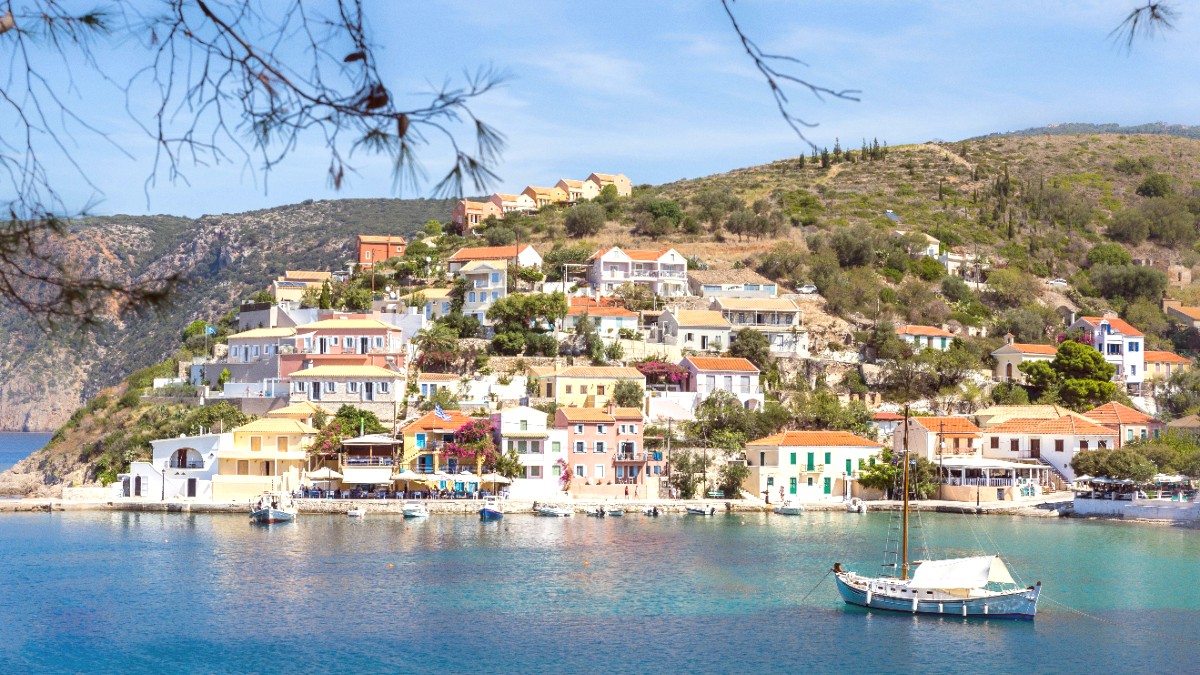
Greece
The island's history as a Venetian protectorate for several centuries profoundly shaped its culinary identity. This influence brought techniques like slow-cooking, the use of sweet spices in savory dishes (like cinnamon and cloves), and ingredients not as common in other parts of Greece.
Kefalonian food emphasizes fresh, seasonal ingredients, local meats (especially lamb, goat, and rabbit), and seafood directly from the Ionian Sea. Olive oil, produced abundantly on the island, forms the foundation of nearly every dish.
The omnipresent base of Mediterranean cooking. Kefalonian olive oil is flavorful and used generously in salads, cooking, and as a finishing oil.
Oregano, thyme, rosemary, dill, and parsley are staples, often picked fresh. Cinnamon and cloves appear in savory dishes.
Kefalonia produces excellent cheeses, including creamy Feta, firm Kefalotyri (a salty, hard cheese often grated), and various local dairy products.
A savory pie with a rich filling of various meats (lamb, pork, beef), rice, and spices like cinnamon and allspice, baked in a flaky pastry.
Find it in most traditional tavernas across the island.
A hearty, warming soup made from different legumes (beans, lentils) and vegetables. It is a simple, nutritious dish, especially popular in winter.
A traditional, comforting soup.
A pasta dish featuring slow-cooked beef or rooster in a flavorful tomato sauce with cinnamon, cloves, and bay leaves.
Rich and aromatic.
Greece's most famous street food. Slices of seasoned meat cooked on a vertical rotisserie, served wrapped in warm pita bread with tzatziki, tomato, onion, and often fries. Skewers of grilled meat are also available.
Ouzo (anise-flavored aperitif), Tsipouro (strong pomace brandy), and Retsina (resinated white wine) are traditional Greek alcoholic drinks. Local wines beyond Robola are also available. Greek Coffee/Frappe are popular non-alcoholic options.
Formal fine dining restaurants are limited in Argostoli itself. However, some upscale tavernas along the waterfront offer a more refined dining experience with higher quality ingredients and presentation.
This is where Argostoli excels. Many tavernas and restaurants line the Argostoli waterfront (Paralia) and the side streets off Lithostroto.
For quick, delicious, and very affordable meals.
The Argostoli Central Market, located near the harbor, is a great place to find fresh fish, fruits, vegetables, and local products. It is perfect for self-catering.
Large supermarkets like AB Vassilopoulos and Sklavenitis are in Argostoli, offering a wide range of groceries, local products, and international items.
While traditional Greek and Kefalonian food dominates, some restaurants offer Italian cuisine (a nod to historical ties) or other European dishes, mainly catering to the varied tastes of visitors.
These options are typically found in more tourist-oriented areas.
Greek cuisine is generally vegetarian-friendly due to its emphasis on fresh vegetables, legumes, and grains. Vegan options may require careful ordering to avoid hidden dairy or eggs.
Awareness of gluten-free needs is growing. Communicate clearly with restaurant staff. Naturally gluten-free options include grilled fish, meat dishes (ensure no flour in sauces), and salads.
Consider carrying a Translation card to explain allergies in Greek.
Options for Halal and Kosher food are very limited to non-existent in Argostoli. Travelers with strict requirements may need to self-cater and bring specific products.
Traditional "kafeneio" (coffee house) are social hubs where locals gather for coffee, conversation, and sometimes backgammon. It offers a real local experience, especially in the morning.
Found in main squares or smaller villages.
Enjoy a meal at a taverna along the Argostoli waterfront, watching the fishing boats and sea turtles, or at Katavothres Restaurant for a sunset vista.
Consider waterfront dining for picturesque scenes.
Awareness of gluten-free and other dietary allergies is growing. However, it is always best to communicate clearly and directly with restaurant staff.
Options for Halal and Kosher food are very limited to non-existent in Argostoli. Travelers with strict requirements may need to self-cater and bring specific products.
Some local operators or hotels may offer private cooking classes focused on Kefalonian cuisine, teaching you to prepare dishes like Kreatopita or Pastitsada.
Kefalonia’s agricultural richness offers opportunities to visit local olive oil producers or honey farms.
Throughout the summer, local villages often host "panigyria" (festivals) that feature traditional food, local wine, music, and dancing.
Buy products from small local shops directly.
No formal short-term Greek language courses are readily available for tourists in Argostoli.
Simple greetings are welcomed.
Meals are meant for lingering and conversation. Do not expect rapid service; enjoy the relaxed Greek pace of dining.
Ordering several mezedes (appetizers) to share among the table is customary and a great way to experience many flavors.
While not mandatory, rounding up the bill or leaving a small tip (5-10%) for good service is a kind gesture.
Greek cuisine often features fresh vegetables and legumes. Vegan and gluten-free options may be found with careful ordering.